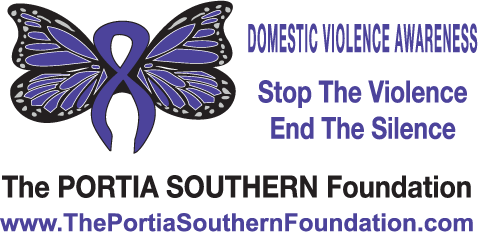
DOMESTIC VIOLENCE AWARENESS
OVER 20,000
WOMEN HAVE BEEN
POSITIVELY IMPACTED
BY DOMESTIC VIOLENCE

HER STORY
The Portia Southern Foundation was started in October of 2015, as a non-profit organization, geared to advocate for families that felt they had nowhere to go, nowhere to turn, and no one who would listen.
Portia Southern was a silent victim of Domestic Violence till her death. She was born April 29, 1985. She attended High School for Law Enforcement and Criminal Justice. Upon completion, she graduated with honors and went on to pursue her career in the United States Navy. She achieved numerous medals and commendations during her military career. Portia was a Quarter Master 2nd Class on Assault Craft Unit 1 on Coronado Island, CA. She had a passion for everything and everyone she touched. So much so, you could say that she was a perfectionist. Her family, friends, and colleges, loved and admired her drive and determination. She left her smile upon everyone she touched.
Portia was a very strong and strong willed individual. She could handle and excel in any task or assignment given to her with no supervision. She took her strengths and used them in her professional and personal life. She could hold her on. Whatever problem or situation she faced in her marriage, she felt confident that she could handle it. This last trial to right any wrongs in her relationship was more than she or anyone could imagine. An early day off duty to take the kids to the dentist would be her last. She walked into her home to find her husband sitting there, waiting for his perfect moment. As documents would show, this was not the first encounter, but certainly the last. This time unlike others, Portia though she could defuse whatever was wrong (again), but could not save herself or her husband. This would be her last cry, leaving two innocent children without a mother or a father.
I, Veda Cavitt am the mother and the voice of Portia Southern., advocating for all those victims that have been silent. I will help find protection, shelter, and resources for those victims. I will scream to the Heavens until someone listens.
THE HARD TRUTH
60%
HAVEN'T REPORTED TO THE POLICE
93%
ARE VICTIMS DOMESTIC ABUSE
40%
DON'T TELL ANYONE ABOUT IT
Domestic Violence Awareness Month takes place every October. It evolved from a Day of Unity first observed in October, 1981 by the National Coalition Against Domestic Violence. The intent was to connect advocates for survivors of abuse across the nation who was working to end violence against women and their children. The Day of Unity soon became a special week when a range of activities were conducted at the local, state and national levels, and has since grown to become a federally observed month of awareness and action on domestic violence.
Understanding the Legislative Process
The legislative process is the means by which a bill becomes a federal law.
How a Bill Becomes a Law
First, a member of the House or Senate drafts a bill and introduces it in their chamber. The bill is then considered and voted on by the committee of jurisdiction and then it is sent to the floor to be voted on by the entire chamber. The process may then be repeated in the other chamber, or a similar bill may be proceeding at the same time. Eventually, legislation that is passed by the House and Senate must go to “conference” where House and Senate members work out the differences before passing the legislation through their respective chambers. Then the bill is sent to the President to be signed into law.
For more information on how a bill becomes a law, please visit:
